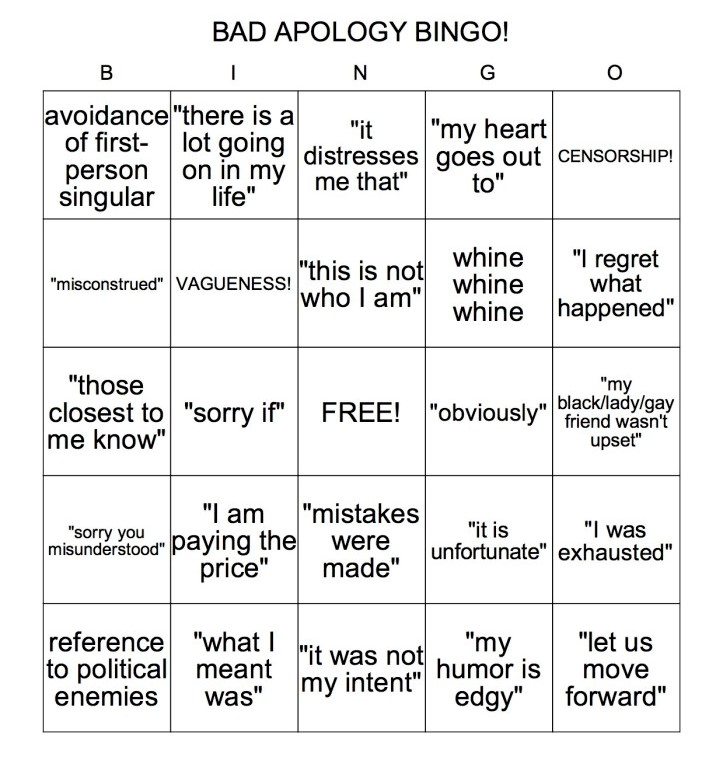Rihanna’s Fenty Beauty line recently launched a set of highlighters, one with a name –– “Geisha Chic” –– that fans of the brand were quick to critique.

“There is a long oppressive history of geisha culture and the fetishization of it is something people need to move away from,” one person wrote on Fenty’s Instagram.
The company’s apology was quick and forthright: “We hear you, we have pulled the product until it can be renamed. We wanted to personally apologize. Thank you so much for educating us.”
WATCH: Biden jokes ‘I had permission to hug Lonnie’ as he continues to face allegations of unwanted contact

Compare that to presidential hopeful Joe Biden’s response to allegations he inappropriately touched two women, says Marjorie Ingall, co-founder of SorryWatch, a blog that analyzes public apologies around the world.
In a two-minute video posted to Twitter this week, Biden pledges to be “more mindful” of personal space, because “the boundaries of protecting personal space have been reset, and I get it.”
It’s the type of apology Ingall would put on her blog under the not-so-great category.
“He doesn’t own it,” she says.
“He doesn’t say, ‘I get it now, I’m really sorry, I won’t do it again.’ It’s all these extraneous words. Stop with all the words.”
There has been no shortage of public apologies in recent years: The Washington Post did a round-up of the strangest celebrity apologies of 2018, featuring Katherine Heigl’s apology for posting silly photos in a cemetery, while many have dissected nearly every apology or non-apology of the #MeToo era and found many lacking.
“It seems that we have a greater quantity of apologies but of lower quality,” says Nick Smith, a philosophy professor at the University of New Hampshire who wrote the book I Was Wrong: The Meanings of Apologies.
WATCH: Boeing CEO Dennis Muilenberg acknowledge in a pre-recorded message that a faulty sensor may be to blame for two deadly crashes of its new 737 MAX 8 jets

While people certainly seem to be apologizing a lot lately, are they actually? And if non-apologies are the new apologies, do apologies hold the same weight as they used to?
While there is certainly room for nuance in an apology, Smith says he usually asks a few questions designed to “take us to the heart of the meaning of an apology.”
They are:
- Did the offender explain what she did with an appropriate degree of specificity?
- Does she accept blame rather than mere sympathy? Does she cast the offence as an accident or otherwise deny that it was her intention to harm?
- Does she make clear why her actions were wrong and identify the principles she violated?
- Does she promise not to do it again and redress the problem she caused? Does she fulfil those problems?
An immediate red flag, Smith says, is if the apology starts with, “Sorry if…” The implication, he says, is that “the offender doubts the legitimacy of the harm caused.” Another red flag? Apologies that come with non-disclosure agreements.
SorryWatch has created three “Bad Apology Bingo” cards now, designed to highlight some of the words you should avoid if you’re trying to give a heartfelt apology.
“Those closest to me know,” “obviously,” “I am paying the price,” “my black/lady/gay friend wasn’t upset,” and “my entire career has been about,” to name a few.
“We are getting better at recognizing collectively when an apology is good or bad,” Ingall says.
“The thing is, when we ourselves are in the position of apologizing, everything we know to be true goes out the window because the rules we set for ourselves are different than the rules we set for society.”
Maja Jovanovic is a self-described “apology hater” (she’s also a sociologist). Part of the reason she hates apologies is because “they matter and women over-apologize and with every needless, useless apology that we give, it chips away at our confidence.”
That isn’t to say that men don’t apologize, Jovanovic says. She points to research out of the University of Waterloo that shows that when men and women believe they’ve done something offensive, they will apologize.
WATCH: Prime Minister Justin Trudeau apologizes
The difference, she says, is men “have a really high threshold of what they consider to be apology-worthy moments, whereas women see a need to apologize everywhere we go.”
Look at Biden’s apology, Jovanovic says. “His video is really lacking the only words that matter: ‘I’m sorry, I apologize for my behaviour.'”
She wouldn’t actually characterize it as an apology, more a “video defence,” given Biden is running to be the Democratic presidential nominee.
“It was a very deliberate and strategic move,” Jovanovic says, “the avoidance of the literal apology was likely a very deliberate move I’m sure on his part to avoid having that be used against him at a later date.”
At the end of the day, she says, it likely won’t matter for Biden.
While people’s perception of women is impacted by how they over-apologize, Jovanovic says Biden is considered a likeable man.
“His non-apology will survive because his likeability is stronger than his transgression and the public is willing to forgive,” she says.
“Apologies live and die on how others react.”
WATCH: Alyssa Milano faces backlash after supporting Joe Biden amid accusations of inappropriate behaviour
















Comments